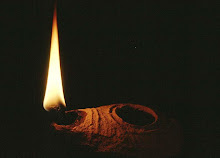When [Jesus] reached the place where the road started down the Mount of Olives, all of His followers began to shout and sing as they walked along, praising God for all the wonderful miracles they had seen. "Blessings on the King who comes in the name of the LORD! Peace in heaven, and glory in highest heaven!" But some of the Pharisees among the crowd said, "Teacher, rebuke Your followers for saying things like that!" He replied, "If they kept quiet, the stones along the road would burst into cheers!"
(Luke 19:37-40 NLT)
From scripture to nature, this is the breadth of the Christian life. I engage with God in the quiet of my bedroom on pages compressed from the lignin of felled trees or out in the fields where trees stand tall and skeletal against the day's grey sky.
Indeed, the truths of nature are found in the words on the page but the experience of those truths, the validation of them (for how will we know something is true before we try it?), is in the depths of the woods or on the heights of the hills.
Man rejected the love of God, brought down a curse on the whole of creation, nature must be imperfect but man could not reject the image of God. I do not believe the image of God only exists in man but resides in all that he made. Romans 1:20 says 'For ever since the world was created, people have seen the earth and sky. Through everything God made, they can clearly see His invisible qualities—His eternal power and divine nature. So they have no excuse for not knowing God.' Any aspect of nature can be traced down to God and I firmly believe that nature still retains some quality of Eden in it, however hard man tries to bring it to ruin.
When the trees are gone, how will man know God? The world will stand and point at concrete and steelwork rising on all sides and say 'God had no part in this; I can introduce you to the men who built all of this with there own weathered hands! One is my brother, one is my cousin's son.' The words of the bible would become senseless when creation was overcrowded and choked by buildings and machinery. It's part of our duty as Christians. Romans 8:19-21 says: 'For all creation is waiting eagerly for that future day when God will reveal who His children really are. Against its will, all creation was subjected to God's curse. But with eager hope, the creation looks forward to the day when it will join God's children in glorious freedom from death and decay.'
God never originally intended for us even to live in houses. Adam and Eve lived in nature but the fall changed that and made the earth inhospitable. The first city was built out of Cain's rejection and mistrust of God's protection over him (Genesis 4:13-17). I don't believe God's calling us to be a rural community, I believe he intends to have his influence in the city as well, but we need that contact with nature to fully understand him. Jesus spoke in rural parables, he spoke of shepherds, farmers, fishermen; men who interact directly with nature and creation for their livelihood.
Every aspect of nature reflects him in some way; the might of the river, the majestic eagle, the towering mountain, the tranquility and ferocity of the ocean. The Romantic poets called it 'the sublime'. The personal response to an external object of awe, reverence, an agreeable fear. That knowledge of ones own miniscule existence against the vastness of creation; the glimpse of the eternal. We define ourselves against God's greatness and the knowledge of his love and consideration of us.
Ralph Waldo Emerson, part of the American Romantic movement put it beautifully like this: 'To the body and mind which have been cramped by noxious work or company, nature is medicinal and restores their tone. The tradesmen, the attorney comes out of the din and craft of the street, and sees the sky and the woods, and is a man again. In their eternal calm, he finds himself.' We find our identity in God.
The bible gives creation a personality, especially in the Psalms. The rivers clap their hands, the mountains sing. Some might say that this is poetic license but I think it's totally true. Nature is alive with the spirit of God. God's word is also alive through his spirit.
God's call is to learn about him through his word, but also through his creation. Pantheists stop short at worshipping the creation, we should use the creation as a pathway into a deeper worship of God. Like any act of profound worship it also echoes into our world, our lives and our situations.
So today, even in the rain which God sends, go into the woods. On a clear night, go out, lie in a field and look at the stars. Draw on the energy and life that comes from spending time in reverence of God and his creativity. God's spirit cannot dwell where it is not reverenced but I believe it is irresistably attracted to a place where it is. Take that life and that energy and give it to your friends, your colleagues, your family.
Like leaking vessels, we must constantly be topped up with the spirit, and the word is important in that, so is prayer, meditation, worship, praise but today, my challenge to you in to draw that spirit from creation itself. The stones still burst into cheers, the trees of the field still clap their hands; we just need to take a moment to adjust our ears to hear the sound of creation's anthem of praise.
Amen.
Monday, 4 May 2009
Subscribe to:
Post Comments (Atom)

No comments:
Post a Comment